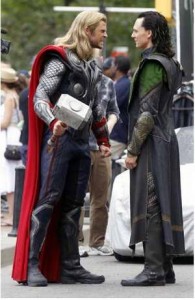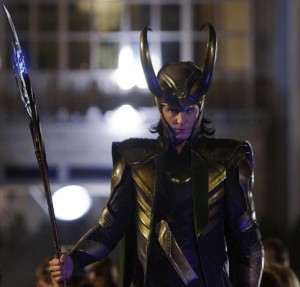An Unbiased Review of the Marvel “Avengers” Movie
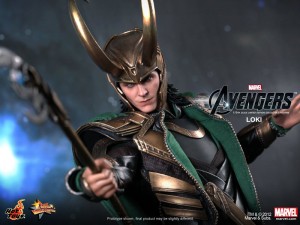
Contains spoilers. For background, see my Unbiased Review of the Marvel “Thor” Movie.
(Also, disclaimer: this review is, like its prequel, tongue-in-cheek and written as if the reviewer is Loki. Some people who do not know me very well apparently failed to realize that and were confused.)
Fired with anticipation after the subtle and intricately imagined commentary on Norse Mythology offered by Marvel’s “Thor” film, I used my one free afternoon on a short conference trip to Oxford to see the sequel “Avengers Assemble” (UK title, which DIDN’T have the 2nd easteregg scene, thank you licensing people. Grrr… I want my 10 pounds back.).
I did a little research in advance, and was glad I did, since the title had misled me to expect treatments of Ragnarok and Baldur’s murder and the betrayal-vengeance cycle surrounding the death of Yigdrasil, but it turns out “assemble” rather than “avenge” was the operative word of this transplantation of a bunch of heroes from other previously-unrelated sagas into the Thor-Loki narrative. I therefore quickly acquainted myself with the relevant corpus of publications, and, despite some confusion, looked forward to the film.
The dialog was snappy and the effects excellent, as was the refreshingly novel absence of a tedious romance. I was pleasantly surprised by the extraordinary writing and attention Hawkeye received, while in fact all the members of the Avengers were charmingly done, but what are a few beautiful flowers blooming in higgledy-piggledy clumps when the garden and its architecture – and above all its architect – have gone? That was Loki’s plan?! Once again, Loki’s true plan, which succeeded, was pure genius, and cunningly designed as a terrible plan which failed. Yet sophistication of his scheme has declined in complexity so radically since his elegant and subtly-worked plan to destroy Bifrost and fake his own death in the “Thor” film that the viewer is left wondering what happened? Was he distracted when he came up with this plan? Further research into the “Marvel Universe” led me to several alternatives. Is he simultaneously waging another battle in the Astral Plane, or the Mojoverse, which requires the majority of his attention? Perhaps we are to believe that this was a cry for attention? This would be consistent with the focus on his youth and desire for respect, treated in both films (though smelling more like a ruse than truth in both). Perhaps we are to believe he was so frustrated that no one noticed the brilliant success of his earlier scheme that this time he has dialed down the subtlety in hopes that at least some of the supposed-genius members of the adversary squad might piece together the logic chain: “Loki is an unmatched genius. This plan is dumb. Therefore this is not Loki’s plan.”
Let us review step-by-step Loki’s “plan” which we, the viewers, are supposed to think was found plausible by such intelligent beings as Bruce Banner and Tony Stark:
- Come to Earth and steal the Cosmic Cube* from S.H.I.E.L.D.**
- Summon an army of alien goons.
- Conquer the Earth. Wa ha ha. Wa ha ha ha ha.
* I recognize that they’re calling the object-of-power the “Tesseract” these days, but it has almost as many titles as the Allfather, so, since this is a saga, should we not show our learning by cycling through all of them?
** All together, Marvel readers: “Supreme Headquarters International Espionage Law-Enforcement Division.” (If you didn’t know it already, memorize it now – it is an important part of your nerd heritage.)
Now, we are asked to have respect for the heroes who sincerely believe that this is the best plan which a primordial avatar of cunning and intrigue could come up with? Really? To be fair, it did have some intermediary steps, so as presented to the heroes it was a bit more complicated. Let’s spell it out more thoroughly, shall we?
SURFACE PLAN. GOAL: CONQUER EARTH (USING ALIEN GOONS) & BECOME KING (WA HA HA).
- Make a badly-thought-through treaty with some unknown aliens where they get the universe but I get Earth.
- Come to Earth and steal the M’Kran Crystal* from S.H.I.E.L.D.**
- Set human minions (including co-opted S.H.I.E.L.D. agents) working on using the Ruby of Cyttorak* to make a portal.
- Get captured by S.H.I.E.L.D.
- Spend time chilling in boring white cell while making the Avengers cat fight.
- Smash S.H.I.E.L.D.’s stuff, drop Thor down a hole, drop Hulk down a hole, make no attempt to kill the Avengers members that can actually BE killed, leave. Tony Stark notices that it’s kind-of odd I haven’t killed the Avengers yet.
- Go to Stark’s house, which is filled with unmatched quantities of awesome technology and data, and ignore said resources completely while waiting around as the Infinity Gems* summon an army of alien goons.
- Smash New York City a bit. NOTE: this is somehow supposed to result in me being king.
- Spend more time chilling in Tony Stark’s house. Dum de dum. Dum de dum de dum. Hey, heroes, is anybody going to notice that… Oh, finally, footsteps. “So, mortals, at last you…” What the? The Hulk! I can’t deliver my awesome speech to you! Well, I could try… um… What vocabulary do you know? “Unworthy beast! I am a god, and!..” SMASH! “Ow…”
- More time waiting in Tony Stark’s House. Less fun now due to Hulk. While the heroes were distracted by goons, some random humans seem to have switched off the Moonstone* and its portal. Huh… a nuke went by… how cute. Dum de dum. Oh, NOW the verbal heroes turn up, now that I’ve got a cracked rib and can’t make speeches. Well, obviously, rather than using my abilities to turn invisible and teleport to, say, escape, I will surrender.
There was some distraction in the middle of this, I grant, since Loki’s intentional capture was totally unnecessary and thus very successful at keeping the good guys guessing, but are we to believe that not a single one of the Avengers or S.H.I.E.L.D.’s staff saw through such an obvious blind?
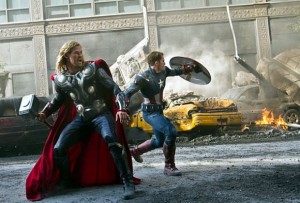
We had one hint of hope for the good team when Tony Stark became suspicious and suggested that Loki was intentionally letting the Avengers live so he could fight and defeat them before the public eye later on. But Stark concluded that this was just because Loki wanted to look cool fighting in public – a theory he should’ve doubted when Loki did not in fact attempt to fight them in public at any time during the final battle. It was rather charming having Stark’s narcissism interfere with his reasoning, assuming Loki would be the same kind of childish attention hog that he is, but the audience then expects a follow-through from Fury or Banner building from Stark’s good start toward the truth. Is the film perhaps intending to prepare for an Avengers-Fantastic Four cross-over by leading us to conclude that only Reed Richards, the Smartest Man On Earth, can actually see through Loki’s blinds? If so, the writers could at least make a blind good enough that we can retain respect for those who fell for it. As it is, Earth’s Mightiest Heroes pretty-much fell for Pull My Finger. Adorable, but not endearing.
Why such a weak plan, writers? You have confirmed for the viewer that the Avengers are idiots (not news), but anyone can tell Loki hasn’t put his true arts into play here. Even when toying with idiots, can’t we expect him to at least exert himself for his own entertainment? We are discussing a being who, in the absence of worthy enemies, turns himself into one and battles on both sides (ref: Utgardsloki) and now he plots straight-forward world conquest with only one blind (the fake capture)? Even when he was just messing with Thor and Odin in the last film he at least had that elaborate double-betrayal power-play attack against his own dear Jotenheim. Have we descended from the heights of tricking Thor into destroying Bifrost to spending half the film kicking our heels? The Father of Monsters bores easily, and the writers cannot expect the viewer to contentedly see him literally twiddling his thumbs. Are we intended to mourn with Loki for the comparative absence of intelligence in this universe? Are we to share his pain at feeling so alone – a firebrand among dull twigs?
Now, let us review Loki’s real plan, which was, like the first one, elegantly veiled, and entirely successful:
TRUE PLAN. GOAL: BRING INTERSTELLAR ATTENTION TO EARTH & TRIGGER KREE INVASION.
- Make treaty with Kree Emperor. Let him think that I don’t know I’m really dealing with the Kree, and that Earth is weak.
- Come to Earth and steal the AllSpark* from S.H.I.E.L.D.
- Set human minions (including co-opted S.H.I.E.L.D. agents) working on using the Key to Time* to make a portal. Get important security info from co-opted S.H.I.E.L.D. agents.
- Get captured by S.H.I.E.L.D.
- Create elaborate diversion in order to buy Tony Stark enough time to hack S.H.I.E.L.D.
- Escape. Tease Thor a lot. Drop him down a hole. Te he. Make no attempt to actually kill the Avengers. They have other uses.
- Go to Tony Stark’s house and harvest hacked S.H.I.E.L.D. data plus all his other juicy science.
- Use alien invasion to bring incontrovertible proof of the existence of alien life before the human media.
- Avengers assemble, united by a common enemy (me!) and defeat the aliens, thus gaining the respect and attention of the Kree Emperor. Earth has now stepped irrevocably onto the interstellar stage, and invasion is inevitable.
- Since the Kree Emperor has vowed revenge on me if I lose, allow myself to be “captured” and taken to a safe, comfortable cell in Asgard, within easy reach of the Platohedron*. My well-established and large force of Earthly minions is never mopped up, and continues carrying out my will while I take a holiday.
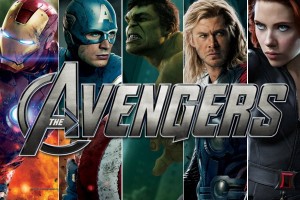 And in case anyone was close to falling into the trap of thinking that the fake plan was the real plan, we are reassured in our subtler reading by such clues as the fact that Loki did not attempt to defend the Eye of Harmony* from the humans who disabled it (whom he must have spotted, since we know has sufficiently good eyesight to pluck one of Hawkeye’s arrows from the sky), and that the impenetrable shield protecting said Stargate* was defeated by a failsafe which the scientist programmed into it while under Loki’s mind control, i.e. at Loki’s desire.
And in case anyone was close to falling into the trap of thinking that the fake plan was the real plan, we are reassured in our subtler reading by such clues as the fact that Loki did not attempt to defend the Eye of Harmony* from the humans who disabled it (whom he must have spotted, since we know has sufficiently good eyesight to pluck one of Hawkeye’s arrows from the sky), and that the impenetrable shield protecting said Stargate* was defeated by a failsafe which the scientist programmed into it while under Loki’s mind control, i.e. at Loki’s desire.
The blind finishes nicely. We are left uncertain about how Loki intends to play the Kree invaders once they come. Will he steal the Dark Crystal* from Asgard at his leisure, and use it to buy favor with the invading Kree, gaining access both to the delights of a worthy war and to the ear of the Emperor which he can comfortably exploit? Or will he play the opposite card and help the Asgardians save Earth? As Earth’s only allied alien world, the Asgardians will certainly make natural leaders in the coming conflict, and as Thor and the other Aesir take the battlefield before the public eye, reinstating awe of the gods in human hearts, Loki would naturally be recruited as the master strategist, and save Earth and Asgard, winning the love and loyalty of all. Or he could join and betray both sides, if that’s more fun.
The possibilities tantalize, as does the unfinished saga of the data Stark hacked from S.H.I.E.L.D., which, of course, the writers would not have introduced if it was going to just lead nowhere. After all, as the writers quest to simulate the infinite and intricate puzzle-play of the Dark Trickster’s psyche, we must presume that every detail introduced is but one thread in some slowly-unfolding master plan. In an inferior script, we might accidentally think the writers had no further plans for such details as the criminal syndicate the Black Widow was interrogating at the beginning, the worldbuilding implications of S.H.I.E.L.D.’s airship and invisibility technology, Stark’s comments about his suspicion at the levels of the Gamma Radiation which mutated Banner into the Hulk, and the great effort Loki went through early in the final battle to stab Thor with the tiny dagger which, since it had a blade too short to inflict meaningful wounds, was obviously either poisoned, cursed or implanted a sophisticated tracking device or other micro-tech object harvested from Stark Enterprises or S.H.I.E.L.D. HQ. When, we are left wondering, will Loki’s mid-control over Hawkeye re-assert itself? (Since we cannot possibly be expected to believe that a mere concussion could undo mystic space-alien mind engineering.) And when will Loki activate the mind-control which Tony Stark thinks inexplicably failed? Does he secretly activate it every night, so Stark is unknowingly spending half his hours preparing new toys at his divine master’s command? Or will he save Stark for a special moment when his enemies are a sniff from victory? We who await the sequel can spend a happy year weaving and unweaving schemes in our minds and cackling at the consequences. Yet all this subtle mind-play is only after the movie, a take-home game, something we were not at leisure to enjoy during the film itself, which was dominated only by the Avengers’ blindness and Loki’s half-heartedness and boredom.
Have they intentionally created a movie which is more satisfying to think about than to actually watch? If not, is the helf-heartedness of Loki’s fake plan just bad writing? After the immensely subtle critique of gender in Norse culture which we took from the Thor film, we cannot assume pure clumsiness on the part of the planning team. Right?
The best reading I can come up with is that this is a harshly contemporary self-critique of the history of Marvel’s attempts to offer escapist wish-fulfillment to its young and nerdy readers. Many comics heroes but especially the principle Avengers, begin as very straight-forward wish-fulfillment for the intelligent, physically weak nerdy teen boy reader who turned to comics as an escape after a harsh school day of being bullied, rejected and ostracized. Captain America (1941) accomplished this by offering a heroic alter-ego with the kid too weak to aid the war effort who, through the utopian power of science, becomes a hero and savior of his country. Over the next decades, as war’s easy enemies gave way to peace’s complexity, the young comics nerd hungered not only for the promise of the possibility of becoming a hero, but for validation of the intelligence which made him an outcast. Hence both Hulk (1962) and Thor (1962) were, in early days, nerdy scientific braniacs (in Thor’s case also physically disabled) who transform into physically powerful muscle-men and save the day, but also save the day through their intelligent scientist halves, proving that someday the intelligence which makes the nerdy reader alone will also make him valuable.
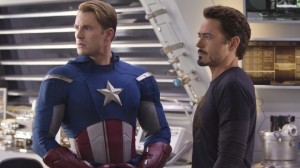 Enter Iron Man (1963), the selfish, rich industrialist engineered by his creators to be everything the sad young nerd does NOT want to identify with, since his selfish and effortless profit-seeking is contrary to the American good boy work ethic, his dabbling in weapons is un-charitable, and his general happiness and success makes him hard to identify with, yet through sheer good writing the creators win kids over with his charming, impish personality. Next, advance a generation. A new crop of readers feeling more alienated and self-identified as a sub-culture whom peers and grown-ups will never understand falls in love with the hated and feared X-men, who split the Marvel universe permanently into two semi-separate halves, the traditional hero stories and the mutant stories. As decades advance, Marvel struggles to maintain reader interest in Hulk, Captain America, and in Thor, whose weak nerd persona is virtually and, later, entirely retired as new readers find more excitement from the myth-magic and family struggles of the gods than they do from the crippled medical student with whom they no longer identify.
Enter Iron Man (1963), the selfish, rich industrialist engineered by his creators to be everything the sad young nerd does NOT want to identify with, since his selfish and effortless profit-seeking is contrary to the American good boy work ethic, his dabbling in weapons is un-charitable, and his general happiness and success makes him hard to identify with, yet through sheer good writing the creators win kids over with his charming, impish personality. Next, advance a generation. A new crop of readers feeling more alienated and self-identified as a sub-culture whom peers and grown-ups will never understand falls in love with the hated and feared X-men, who split the Marvel universe permanently into two semi-separate halves, the traditional hero stories and the mutant stories. As decades advance, Marvel struggles to maintain reader interest in Hulk, Captain America, and in Thor, whose weak nerd persona is virtually and, later, entirely retired as new readers find more excitement from the myth-magic and family struggles of the gods than they do from the crippled medical student with whom they no longer identify.
Arriving at the third millennium, a series of movie revivals proves that the audience favorite is Iron Man, who, with his playful selfishness combined with the inevitable heart of gold and obligatory greenwashing, turns from weapons to sustainable energy and proves to the America of eco-guilt and rampant consumerism that we can have our Barbie dreamhouse, celebrity parties, flying sports car and be a jerk and still merit public love and a supermodel fiancée if we find what the current world dreams of: a way to save the environment without reigning in conspicuous consumption. Tony Stark doesn’t even care about being an astronaut—he cannot be the intended alter-ego of the nerd kid who hides Heinlein and Asimov under the covers. As for Captain America, Marvel judges (rightly) that modern audiences can only appreciate him as an historical artifact, a capsule of the loyalty, purity and politeness of a lost era. So far we have come. What now of the alienated brainy kid reader, who may not be the bulk of the film’s audience but has nurtured Marvel and its characters from their inky infancy?
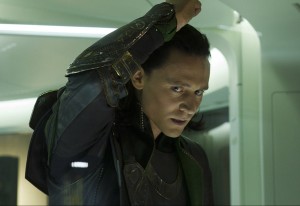 Enter Loki, the smart, less-physically-impressive kid who can out-think his and every species and has lived in Asgard under the shadow of Thor, now reframed as the popular jock. We cannot but recognize our nerd-alter-ego, suddenly recast as the villain! With artistry he undertakes to revolutionize his universe, first exploring the depths of space, then taking away from Odin and the lazy Aesir the easy space-travel technology they have grown too complacent to use. Thus he creates a new era in which Odin must (as the film specifies) conjure dark powers to send Thor from world to world, achieving a strange equality with humanity which is struggling so hard to touch the stars. Surely now gods and men (who have had so little contact in recent, forgetful centuries) will reach toward one another once again, if only because doing so is now a heroic feat again on the part of bellicose gods who have no other great tests on hand. No one notices.
Enter Loki, the smart, less-physically-impressive kid who can out-think his and every species and has lived in Asgard under the shadow of Thor, now reframed as the popular jock. We cannot but recognize our nerd-alter-ego, suddenly recast as the villain! With artistry he undertakes to revolutionize his universe, first exploring the depths of space, then taking away from Odin and the lazy Aesir the easy space-travel technology they have grown too complacent to use. Thus he creates a new era in which Odin must (as the film specifies) conjure dark powers to send Thor from world to world, achieving a strange equality with humanity which is struggling so hard to touch the stars. Surely now gods and men (who have had so little contact in recent, forgetful centuries) will reach toward one another once again, if only because doing so is now a heroic feat again on the part of bellicose gods who have no other great tests on hand. No one notices.
Then our lonely genius hears of an initiative to assemble heroes: fellow geniuses Stark and Banner who might recognize his plan; great soldiers Black Widow and Hawkeye worthy, as few since the Viking age have been, to battle gods; the relic of the last great era of epic wars Captain America; and Thor himself who must surely, with such great help, finally realize what is happening. This time he does not plan a small battle but a grand one that will change the Earth forever and re-initiate an age of greatness, monsters, many worlds and many races, Kree as good as Jotuns. Remember, at this point in the Marvel movie continuity we are well past First Contact, but the government has concealed all knowledge of the extraterrestrial intelligences with which it has had extensive contact. Loki will change that, crack the world’s shell and initiate a great (if dark) new age. Think again of the young nerd who is obviously supposed to identify with Loki. Here Earth already exists in the wished-for age of science-fiction, but government and hero alike—even our beloved, toy-loving Iron Man—is covering it up. Today’s young nerd does not want peace and safety (as Captain America’s reader did) he wants Star Fleet and Farscape. Loki makes that happen. Giant space-fish corpses in Manhattan will change the human race forever. Mankind will psychologically become Vikings again, warriors fighting back against a universe of cold and distant monsters. Perhaps this will bring Aesir and Human close again, especially as the two races face the Kree together. However, to achieve this sci-fi revolution, Loki has burned too many bridges to be welcome again on Earth or Asgard.
As for Loki’s interest in the Avengers, there is in this reading more to it than his simple desire to use them to prove to Aesir and Kree that Earth is worth fighting. For a lonely god, who would rather face fire and arrows on the battlefield than play checkers in Asgard, his one hope for companionship lies, not in winning over his status-quo-loving brother, but in attracting the attention of intelligences like his own. Surely, if he leaves enough clues, Stark or Banner will realize.
And here we see why Loki’s fake plan had to be so mind-bogglingly obviously fake: even when he leaves every clue he can to his true motives, the smartest men on Earth don’t notice. It can’t be that they couldn’t see the clues, but the conclusion itself—that a genius like them is fighting FOR a brave new age instead of against it—was somehow incomprehensible to them.
What message are we to take from this? The message I can see is this: The different kinds of nerds cannot communicate. Banner is the nerd as portrayed in the 1960s and 1970s, the age when fiction focused on fears that, if science trespassed into God’s territory, we would, like Frankenstein, be struck down. Banner has renounced his nerdliness, given up on research and human inquiry, and dedicated himself to the palliative care of the status-quo. Offer him a sci-fi revolution and it falls too far outside his realm of understanding for him to recognize it. Iron Man, meanwhile, has become the commercialized nerd of the Geek Squad and the Genius Bar, lauded in sitcoms on the understanding that he serves the economy by fixing our computers and creating faster, smaller iPads, that he will let us all be spoiled and happy our whole lives if we compensate for our luxury with sufficient technology. He works for progress, but a progress which will give us better toys and more wealth, not social change, nor revolution. Offer him First Contact and he’s more interested in hacking S.H.I.E.L.D. to make sure the government isn’t getting its bloody hands on our green energy future. He wants to privatize World Peace, not change the world order. Loki—the sci-fi nerd—can drop the most overt clues in the world, and he will not be understood by these other kinds of nerd—the self-fearing nerd of earlier literature and the commercialized nerd which contemporary society wants the young reader to grow up to become. Even the hints dropped in Loki’s speeches about how mankind seems to want to live in complacent servitude fail to make anyone think of rebelling against a world government which has not only hidden the truth about aliens and gods from mankind but is hiding technology (airships and invisibility!) from the public as well. Stark and Banner will not open the public’s eyes.
Loki will. He will not give up on changing the world. He will not be content as a caregiver, or a codemonkey. He will be an astronaut, even if it means he has to be a villain. He will create the World of Tomorrow, even if he has to live in it alone. After all, with no one able to understand him well enough to pierce his intentionally-obvious blinds and realize his true intentions, he already is alone. The fact that the only genuine setback Loki encounters is the physical assault by Hulk (the accursed scientist who tried to make himself a god, at once Frankenstein and Monster) suggests that the revolutionary who dares push past the bounds of the human will still be punished for his hubris, not by the divine/cosmological retribution of Nature which undid Frankenstein and Banner, but by the wrath of those generations who believe in such a law of Nature and will make themselves its agents, tearing down the revolutionary in service of a perceived cosmic justice.
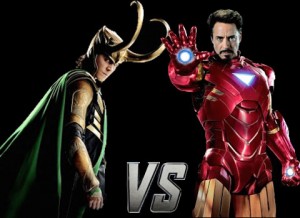 Thus my conclusion: Marvel’s Avengers Assemble film is an elaborate commentary on the reduced funding the Space Program received in the last budget cycle, viewed through evolution of nerd culture, specifically the increasing frequency with which the “commercialized nerd” has appeared in mainstream popular media (from advertising to Big Bang Theory). The film’s creators are arguing that, even as society is embracing and cultivating the commercialized nerd who helps the economy and supplies the consumerist status quo with toys and technological solutions, that public nerd-love is concealing the fact that society and the government are stifling and rejecting the revolutionary nerd who still aims at Mars and beyond. The little boy who dreams of living in the future is being tricked into thinking the World of Tomorrow is merely the World of Today with more toys, and if he escapes that propaganda then he finds himself an enemy of the present, while his adversaries are armed with weapons built by his fellow nerds. If Earth or the Asgardians had cared enough to try to rebuild Bifrost and continue contact (i.e. if the Space Program had more public support), Loki might have put his genius at the service of such ambitious races, instead of having to become their enemy. By failing to realize the cultural importance of First Contact (read the comparative lack of discussion of the retirement of the Space Shuttle), Stark and Banner’s ignorance proves the revolutionary is truly alone (we must look to privately-funded space travel?). That it is ultimately not Stark but Banner (the nerd who fears his own power) who defeats Loki suggests that the writers think the biggest obstacle is the nervous and comparatively conservative baby boomer generation of ex-comics readers, who dabbled in sci-fi as kids but gave it up on reaching adulthood, and can tolerate Stark’s playful goading but not Loki’s attempts to use science to achieve real change.
Thus my conclusion: Marvel’s Avengers Assemble film is an elaborate commentary on the reduced funding the Space Program received in the last budget cycle, viewed through evolution of nerd culture, specifically the increasing frequency with which the “commercialized nerd” has appeared in mainstream popular media (from advertising to Big Bang Theory). The film’s creators are arguing that, even as society is embracing and cultivating the commercialized nerd who helps the economy and supplies the consumerist status quo with toys and technological solutions, that public nerd-love is concealing the fact that society and the government are stifling and rejecting the revolutionary nerd who still aims at Mars and beyond. The little boy who dreams of living in the future is being tricked into thinking the World of Tomorrow is merely the World of Today with more toys, and if he escapes that propaganda then he finds himself an enemy of the present, while his adversaries are armed with weapons built by his fellow nerds. If Earth or the Asgardians had cared enough to try to rebuild Bifrost and continue contact (i.e. if the Space Program had more public support), Loki might have put his genius at the service of such ambitious races, instead of having to become their enemy. By failing to realize the cultural importance of First Contact (read the comparative lack of discussion of the retirement of the Space Shuttle), Stark and Banner’s ignorance proves the revolutionary is truly alone (we must look to privately-funded space travel?). That it is ultimately not Stark but Banner (the nerd who fears his own power) who defeats Loki suggests that the writers think the biggest obstacle is the nervous and comparatively conservative baby boomer generation of ex-comics readers, who dabbled in sci-fi as kids but gave it up on reaching adulthood, and can tolerate Stark’s playful goading but not Loki’s attempts to use science to achieve real change.
Anyway, that’s the only reading I can find which explains why Loki’s plan was so dumb. I mean, it could’ve just been a poorly-thought-out script, but a bad script? From a comics movie? Never.
Now, when precisely to switch-on the Tony Stark brainwashing… So many possibilities…
20 Responses to “An Unbiased Review of the Marvel “Avengers” Movie”
-
This is a thing of beauty.
-
Thank you for this. It is brilliant.
-
An insightful review, one worthy of Loki himself!
-
Exquisite.
-
I was just thinking today about “A New World” and “Somebody Will” and wondering if you were going to link them up somehow. This is not actually that, but clearly not unrelated.
-
Ha! Awesome review.
I’d just like to point out that the first Loki “poster” isn’t actually a film poster, it’s a picture of the 1/6th scale Loki action figure from Sideshow Collectibles. http://www.sideshowtoy.com/?page_id=4489&sku=901874&ref=nextopia
-
Here’s the funny thing. Were this a Soderbergh film or even a Cameron film, I’d think this theory of yours was at best a masturbatory fantasy.
But this is a Whedon film. We know he’s got a mastery of the source material, we know he has respect for the characters. He’s shown time and again his ability to create a convoluted plan around flawed characters and a mastery of subtlety that actually makes this plausible.
Impressive. Kudos to you.
-
Now I desperately want to read your novelizations of both movies.
-
You really should try to contact Mr Whedon with your hypothesis and see what he says, I’d love to know.
-
Speaking without irony for a moment, movie scripts for big franchise films like this go through so many rounds of committees and revisions and input from executives and producers and so on that it’s rarely possible to credit even the official writer with the overall script. Thus while line-by-line dialog we can certainly attribute to Joss Whedon, I was careful to always say “writerS” when referring to the overall plot, over which he inevitably had only partial control. This is one of the sad facts which makes the odds of a genuine multi-film subtle plan such as I’ve described here wildly unrealistic. Still, it’s fun to imagine. And yes, I too would certainly love to have this review be seen by someone on the production committee, though, since a sequel to this version of the film would certainly be more fun than a sequel to the version in which Loki was just trying to conquer the Earth, and they can always say (in good Loki-trickster spirit) “I meant to do that…”
-
Stark and Banner may have too narrow a view, but Jane Foster still dreams big. And her former mentor now has some practical experience in stargate-building.
-
Fairly well thought out, except for one thing. There’s a reason that Loki’s mind powers don’t work on Stark, and it is because Loki’s spear didn’t pierce Stark’s heart because Stark doesn’t have a heart. He has a machine for a heart. (I’m not sure how you missed that. It was one of the funniest parts of the movie, for me.) So, he’s not going to fall under Loki’s spell in the future because of this encounter, at least.
-
What was the bracelet that stark put on just before the attempted brainwashing? Lost in the editing? I suspect you give the writers too much credit. I really hope not though.
Also most geeks know that manned space exploration is for the ex military geek jock astronauts. Real exploration is better done with robots. With the obvious exception of the single stage 6 month trip to mars. Not Bushes diversion to the moon to set up a helium 3 harvesting test plant [for when his oil runs out]. The moon diversion is just designed to set up a moon mining company and then lose the mars funding. Its the whole race to the moon pays for ICBMs research, debacle all over again. The whole astronaut program can wait until we have our monofilament nano beanstalk woven from an asteroid – ie 2080 or at least a scramjet or railgun launcher. Last thing we need is nasa getting more military shuttles to control space
-
The bracelet Stark put on before the encounter was a tracker and reference marker for the suit that was supposed to catch him midair.
-
-
Just beautiful. Congrats.
-
The bracelets allowed the Mark VII to attach to Iron Man after he was thrown out the window. It was like a homing beacon that would orient the suit.
Also, while this is well thought out , some of the arguments can be addressed.
First, it does what a lot of critiques fall into: it assumes that everyone in the movie has all the knowledge of the viewer. Just like with economic theories, the person in the story often works off of limited knowledge and are subject to their own biases. Loki is no different. He is a “god” and views humanity as lessers, just like his brother Thor does even within the movie. Flaws in his plan can be easily attributed to hubris.
Second, Loki has always been an agent of chaos in the comics. He assumes that role in the first Thor movie and continues it here. Using one enemy against another to foment chaos may be a reward unto itself. The chance at victory and control of the human population may be the secondary motive. Earth was probably his target because Thor had adopted it in the first movie and what better way to get back at your enemy than destroy what he loves. An airtight plan may even be considered undesirable to such a trickster because it is not sufficiently messy.
Third, it is not clear whether Loki knew that Thanos (not the Kree emperor) was behind the aliens (who were not Kree as far as I could tell). If he had figured that out, he may have banked on this knowledge. Loki may have believed that Thanos would step in if things went sideways whether he had express agreeement or just thought Thanos may be forced to enter the fray. Thanos could take down the Avengers on his own, especially after the alien invaders had softened them up if their invasion failed.Iron Man did not say that Loki wanted to fight them in public, he did say he wanted an audience. An audience can allow on decisive battle to break the spirit of the people to fight (shock and awe, etc.). If anything this plan may have been made without the Avengers in mind. Some Avengers would fall below Loki’s radar (Capt. America, Black Widow, Hawkeye). Others would be considered threats if he knew about them (Thor, The Hulk, Iron Man) but could be dealt with. Loki failed to control Iron Man because of his ignorance of Iron Man (the heart bit) which makes sense because of his limited knowledge of humans and also shows limits in his knowledge of his foes other than Thor. Loki may have believed Thor would be called to Earth and the invading force along with Loki could have taken them out. This was most likely his true goal and plan since he only had enmity with his brother but none of the others.
After the Avengers assembled it seemed he got up to speed and contemplated a way to destroy their threat to his plan through his attempt to destroy their desire to unite. He tried to use the staff to create dispute and maybe spur the Hulk into killing them and did manage to create paranoia through the staff’s influence and almost had the Hulk change (when Banner was holding the staff threateningly). Had Hulk killed even one, it is unlikely that Banner (who was already trying to keep his distance) would have returned to help them and it is equally unlikely the group would have continued. The whole enterprise almost fell apart because of the death Coulson who was not even a member of the Avengers.I agree that Hollywood blockbusters are designed by committee and tend to favor the lowest common denominator, but I didn’t think the Avengers insulted the audience’s intelligence like other movies that I will not name. Joss Whedon is a good writer especially when you look at his contemporaries in the movies.
I am sure I can break down much more revered works in similar fashion. I have heard Romeo and Juliet referred to jokingly (but accurately) as “a three day relationship between 2 teenagers that resulted in the death of 6 people.” People enjoy these works of fiction because they address common human emotions they can relate to. -
*stands and starts a slow clap*
-
I’ve read some Norse mythology, and Loki may be a trickster, but he seems to be out more for a fun time than anything terribly complicated. He tricks gods and creatures, craps things up and occasionally comes back to try to make things right.
The Balder fiasco with mistletoe, though, was his one step too far. Hence the eternally-dripping-in-his-eyes snake venom setup.
I love, love, love your master plan, but that’s definitely a smarter Loki than mythology would have it 🙂
-
Tony Stark does have a biological heart not a robot heart. He has a powerful micro generator that powers a magnet to keep shrapnel from piercing his heart. That he built it powerful enough to run an awesome flying death robot suit is just a bonus.
-
To be fair, a better reason why Loki’s staff didn’t effect Tony is more likely he never got anywhere near touching him with it. When he tried to touch Stark the way he had touched Hawkeye all he did was tap the surface of the Arc Reactor.
Also a note, the aliens in the film were the Chitauri, who are the Ultimate Universe equivalent of the Skrulls.
-

